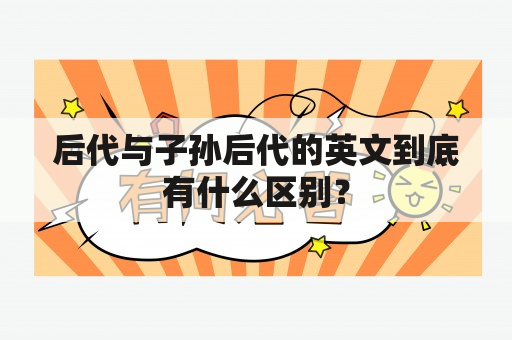后代与子孙后代的英文到底有什么区别?
后代英文: The English word for "后代" is "Descendants". This term refers to all the people who are related to a particular person, living or dead, by blood or by adoption. This includes children, grandchildren, great-grandchildren, and so on. In other words, descendants are the people who come after a person in a family tree.

子孙后代英文: The English word for "子孙后代" is "Posterity". This term refers specifically to all the people who are related to a particular person by blood, who come after him or her in the family tree, and who are yet to be born. In other words, posterity refers to the future generations of a family.
Therefore, there is a clear distinction between descendants and posterity in English. Descendants refer to the people who come after a person in a family tree, whether they are currently alive or not, while posterity specifically refers to the future generations who are yet to be born.
It is important to note that these terms are not always used in everyday conversation, as they are quite formal. However, they are commonly used in legal and genealogical contexts, where precision and clarity are necessary.
In conclusion, while both "descendants" and "posterity" refer to the future generations of a family, they have distinct meanings in English. The former refers to all the people who are related to a particular person by blood or adoption, while the latter specifically refers to the future generations who are yet to be born.
版权声明
本文仅代表作者观点,不代表看看头条立场。
本文系作者授权看看头条发表,未经许可,不得转载。
